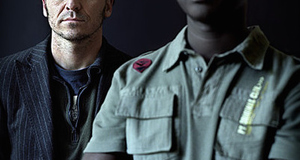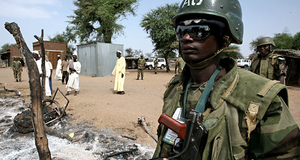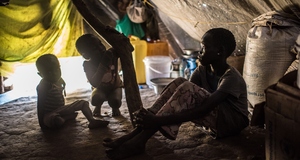"What is the What" as a Religious MemoirLike Eggers’ book, there are many other texts that demonstrate how religion is used on a personal level. Take Mary Rowlandson’s captivity narrative for example: in her historical account of being taken into captivity by Native Americans after they attacked and burned down her town in Massachusetts, Rowlandson continues to turn to God in response to oppression. Throughout her journey, she is separated from her family and is beaten by the Native Americans, but instead of cursing God for her misery, she cries out to him and praises him for the happiness that she does experience. In response to being reunited with her son after several weeks of separation, Rowlandson writes, “whereupon I earnestly entreated the Lord, that He would consider my low estate, and show me a token for good, and if it were His blessed will, some sign and hope of some relief. And indeed quickly the Lord answered, in some measure, my poor prayers” (Rowlandson, 1930, p. 241). Here, Mary Rowlandson discusses her use of religion on a personal level in the form of prayer. Her use of religion in times of hardship is like Deng’s, in that she turns to God on her journey of oppression. Again, loss is dealt with in many ways; however, Rowlandson turns to her religion, and specifically God, as a form of expression in response to the loss of freedom. Religious memoirs such as Rowlandson’s and Deng’s reveal the connection between faith and well-being. At the end of What is the What, Deng has come to accept that his faith has been tested by all of the hardship that he has had to endure, and he realizes that his faith has played a large role in putting him in the position to be able to share his story with others all around the world. Eggers explains that Deng tells his story not only to inform the global community, but he also tells it as a form of coping, stating, “it gives me strength, almost unbelievable strength, to know that you are there” (p. 535). Deng’s faith in God stems far beyond simply feeling proud about doing a good deed, or feeling happy after attending a church service; he believes that his faith literally improves his well-being by giving him strength. It is no coincidence that Deng experiences the connection between faith and well-being. Consider the conclusion that Gail Frankel Perry came to following her research on the two variables: “In general, the relationship is positive; a greater faith measured in a variety of ways is associated with a greater well-being” (Perry, 1998, p. 1). Through the use of qualitative research methods, this study shows how religion can affect one’s well-being, specifically in times of hardship. This study provides evidence that one does not have to be a Lost Boy, or a Kakuma refugee to make this connection of faith and well-being. What is the What is a religious memoir because it asks questions about how people deal with loss and what it means in relation to the whole of reality. Overall, Deng copes with loss and death through the use of religion on a personal level, giving God credit in situations where others might often place blame.Secondly, What is the What fits the criteria for religious memoir because Deng’s faith is evident in times of hardship when he uses religion as a guide in his relationships with others. Eggers’ book ponders basic questions about the role that faith plays in relationships, such as how forming a bond with someone can affect one’s life. When people hear about success stories, there is usually a common theme throughout each story, in that each person had someone to provide a moment of enlightenment or shed light on a special talent or skill. In Deng’s life, this moment of enlightenment took place at a young age. He was baptized as a child and was provided his name from his priest named Father Matong, who ultimately was a major influence for Deng. Eggers writes about Deng’s reflection on the baptism years later in life when he writes, “with my baptism came my Christian name, Valentino, chosen by Father Matong … It was then that, improbably, after years of war, I saw Father Matong again. It was then that he reminded me of my Christian name, told me of its provenance, and demonstrated how to speak it aloud” (p. 14). Here, Deng’s religion is used a guide in his relationship with Father Matong when he explains Deng’s calling in life. Deng recognizes the importance of telling the story of the Lost Boys because the South Sudanese people (specifically the Dinka and Nuer people) have experienced generations of oppression by their own government. After years of little progress, today’s generation has begun to see growth in areas like education. In a country where only wealthy families have the ability to provide their children with secondary education, young boys now are able to learn English and immigrate to industrialized counties like the United States and Canada. Deng’s faith enables him to tell the story of the Lost Boys. Deng is not the only one to realize his unique position of being able to tell the story of the Lost Boys in an attempt to help improve Sudan. There are other Lost Boys who have used religion in their relationships with others. For example, in Courageous Journey: Walking the Lost Boys’ Path from The Sudan to America (2008), Ayuel Leek Deng (no relation to Valentino Achak Deng) recognizes that the Lost Boys’ have potential to greatly influence Sudan. He writes “I must honor all of them. I must find a new life, a better one in the United States of America. I just make a way for those left behind—still suffering and dying from the government’s terrorism against its own people. I am a seed of the new Sudan” (p. 6). As a counselor for the boys that were new to the refugee camp, [Ayuel] Deng used religion as his guide in relationships. His experience spiritually counseling boys that have potential to further influence their country helped him recognize his purpose in life. The importance of this in relation to the whole of reality is that everyone has a calling in life. For some people, their calling may not make an immediate impact. For example, the life of a school teacher may go unnoticed, but the fruit of their labor may show up later in the lives of their students. In the case of both Valentino and Ayuel Deng, their calling is to tell their stories, and they accomplish this task in America by portraying it in the form of a memoir. Eggers’ book also demonstrates how Deng uses religion as a guide in relationships in that he thoroughly explains the extremes of what can happen to an individual who lacks faith and surrounds themselves with bad company. During Deng’s adolescent years, he becomes emotionally attached to a girl named Tabitha. Unlike Deng’s conservative and respective demeanor, Tabitha is a free-spirited individual who is stubborn at times and lives in the moment instead of looking at the big picture. One particular instance in which Tabitha portrays her rash thought process is when she, Deng, and a group of people from the Kakuma refugee camp spend time in Kenya with a host family for a week. Tabitha becomes obsessed with the freedom that she experiences and pressures Deng to run away to Kenya with her. When Deng refuses, claiming that their purpose is to immigrate to America when the opportunity presents itself, she becomes angry. The stubbornness and rash decision-making becomes a pattern for Tabitha throughout her life and it eventually catches up to her when she gets involved in an abusive relationship in the United States, ultimately leading to her death. In the book, Deng claims that her death has caused him to look at his own life, and realize the effect that unhealthy relationships can have. He admits this when he says, “I will not guess His motivations for bringing her back to Him. But her death has proven to be a catalyst for me to think about my faith and my life” (p. 370). Prior, to Tabitha’s death, Deng often had to remind himself and Tabitha that the opportunity to move to the United States was a gift of God. Here, because of her death, he continues to turn to his faith in response to issues that arise in relationships because he views her death as an example of what can happen when someone lacks faith. Deng, of course, has surrounded himself with hardworking people who uplift him and encourage him to succeed throughout his journey, which ultimately leads him to make an impact on people in his life through his storytelling. As opposed to spending time with people who brought him grief, Deng surrounded himself with people who encouraged him to flourish.Continued on Next Page » Suggested Reading from Inquiries Journal
Inquiries Journal provides undergraduate and graduate students around the world a platform for the wide dissemination of academic work over a range of core disciplines. Representing the work of students from hundreds of institutions around the globe, Inquiries Journal's large database of academic articles is completely free. Learn more | Blog | Submit Latest in Literature |


















